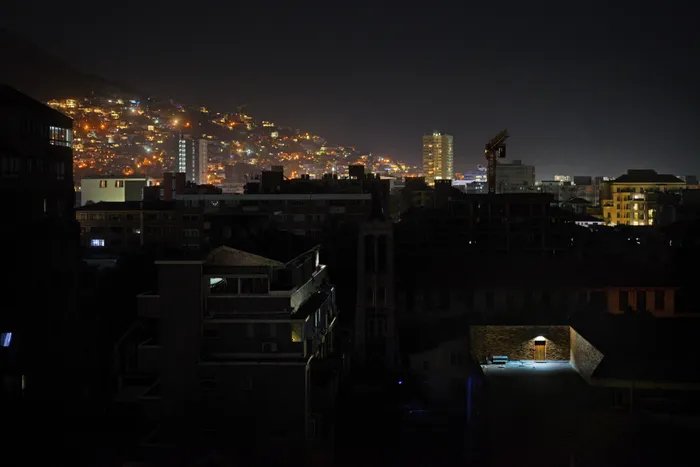State must act in the interests of its people rather than business

Picture: Armand Hough /African News Agency(ANA) - Parts of Cape Town in South Africa are plunged into darkness following loadshedding schedules.
By Kershni Ramreddi and David Hallows
Load shedding is a concept that every South African is familiar with. With Covid-19 bombing the world and putting everything on halt, Eskom’s load shedding, the riots last July, and the recent floods in KwaZulu-Natal and elsewhere, South Africans have experienced disastrous occurrences over the past two years. Not only have these calamities damaged livelihoods, but they have also made recent environmental disasters worse.
It is evident that South Africa, and particularly KZN, has been struggling to recover. In developing and emerging markets, load shedding is a significant issue that has a negative effect on the economy.
It has an impact on economic growth and costs businesses and corporations billions annually. Load shedding has been a reality in South Africa since December 2014; it has already had an effect on the economy, which will now only grow by 2% instead of the expected 2.3%. Due to the decline in business activity, load shedding had a significant impact on the industrial sector, where manufacturing production was impacted more than any other sector. Due to extremely poor maintenance or the fact that Eskom “load reduction” – a scheme is implemented on top of load shedding – the supply is often far more erratic in townships than actual load shedding.
Higher indoor air pollution will be experienced by those who can use coal or paraffin, but many of them are forced into “energy poverty” due to high electricity costs and high paraffin prices. High tariffs are also affecting those without alternative options. Load shedding has an even greater effect on education for people without access to power, making it challenging for children to study and pass exams. Power outages and load shedding endanger the safety and health of schools that employ electricity-powered water pumps, and they also hinder the transition of schools to the digital era. Without electricity, using the internet is challenging, students can’t use their cellphones for data due to a lack of signal, and some people are forced to leave their homes in search of energy and a working internet connection.
The energy crisis poses a long-term threat to the country’s educational development, particularly for students, schools, and higher education institutions with little financial resources. The effects of load shedding on learning, particularly on the country’s ambitious plans to revolutionise education, are much harder to quantify in the near term but equally catastrophic in the medium and long term. Our educational system is still plagued by social and economic inequalities, and the present electrical crisis is contributing to this inequality.
Power outages and the absence of a reliable contingency plan could be disastrous in any healthcare setting, with wide-ranging repercussions.
In hospitals, a power outage may result in situations such as the theatre losing power, various electrical appliances not working, food decaying, refrigerated medicines getting too warm, or computer systems becoming momentarily unusable. Load shedding adds to the stress in the healthcare industry, especially for individuals who live in remote areas and who depend on nebulisers and other devices to get through the night.
Patients who are hospitalised are affected by the impact on hospitals, particularly in regions with significant environmental health problems. Businesses are impacted by power outages, and this is especially true for smaller enterprises that lack the capacity to deal with the disruption of electricity. Since most businesses rely on electricity for lighting, machinery, and other technological advancements to get their work done, losing power results in a loss of productivity for those companies.
Profit is lost as a result of the loss of production. Businesses are unable to continue paying their employees during power outages since they would basically be paying a “non-worker”. Load shedding also creates significant job losses, rising crime rates and exacerbating poverty. Due to an upsurge in theft and burglary, small companies are forced to close during load shedding.
Burglar alarms become ineffective during a power outage unless they have a backup power source, which raises the likelihood of break-ins. When power is restored, there is a surge of electricity that disturbs the electrical system’s constant voltage flow, and electrical components may therefore sustain damages as a result of this.
The April floods in KZN caused irreparable loss of life for loved ones, including children, as well as damage to property, infrastructure, and livelihoods. After the rain ceased, many residents were left without water and electricity for days. As a society, we confront major challenges from these issues, and if we are to address them in a way that lessens the harm to people, animals, plants, and the environment, we must have the courage to believe that we can envision a society that is vastly different from the one we live in.
Together, let’s find the willpower to create a society where the government works for and plans with its citizens rather than with large polluting corporations whose greed for riches is bringing our planet ever closer to a climate emergency.
Ramreddi is Energy and Just Transition Project Officer at the South Durban Community Environmental Alliance and Hallows is from GroundWork